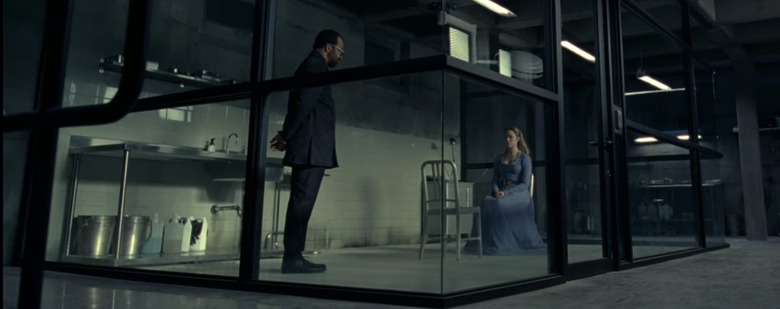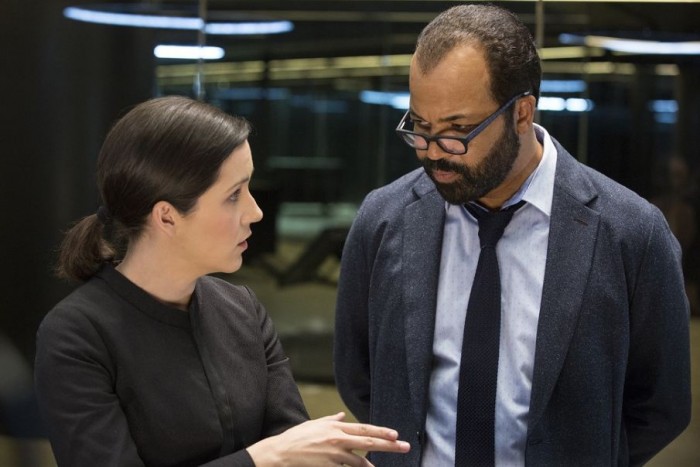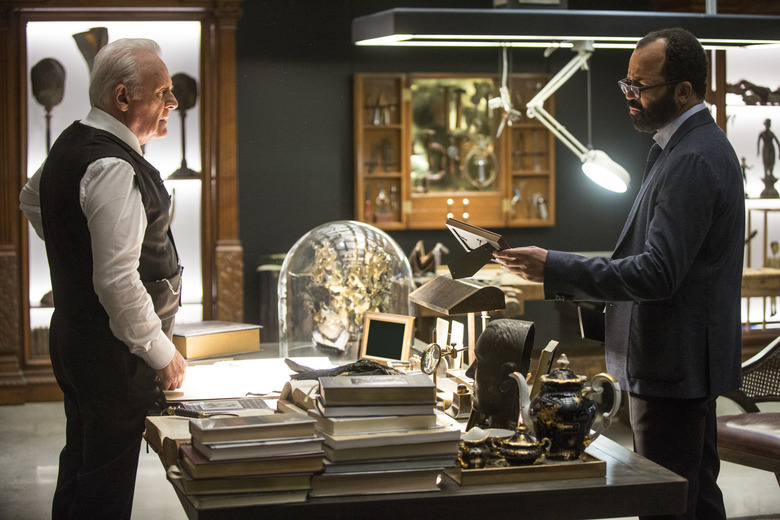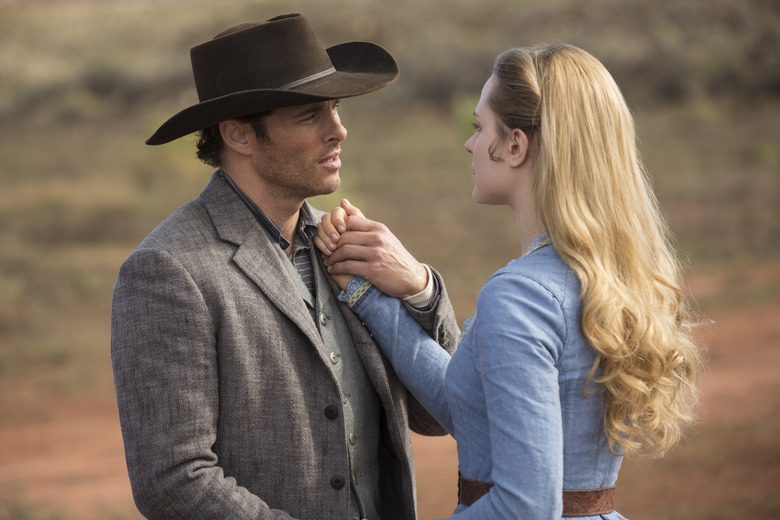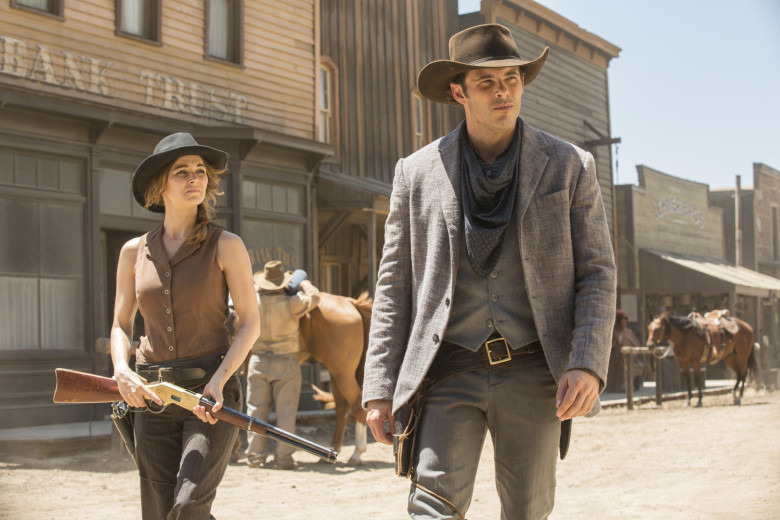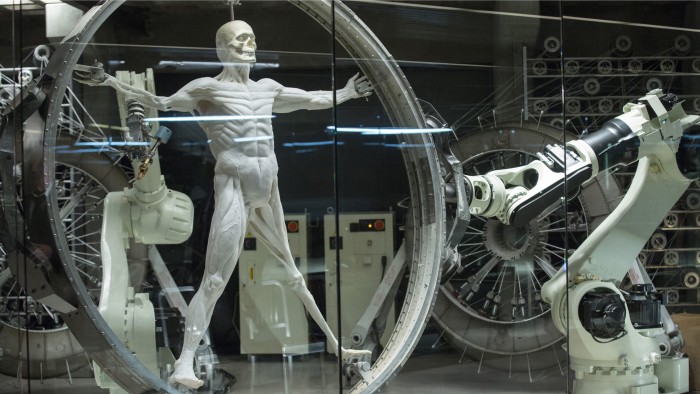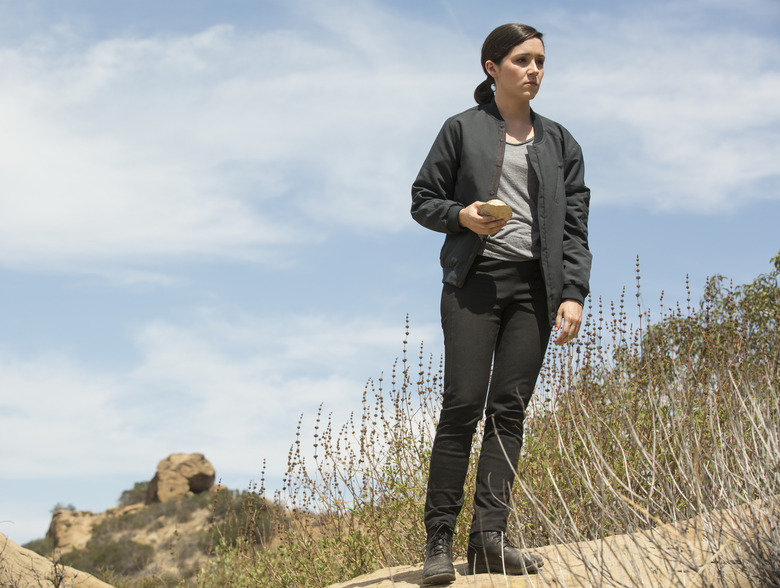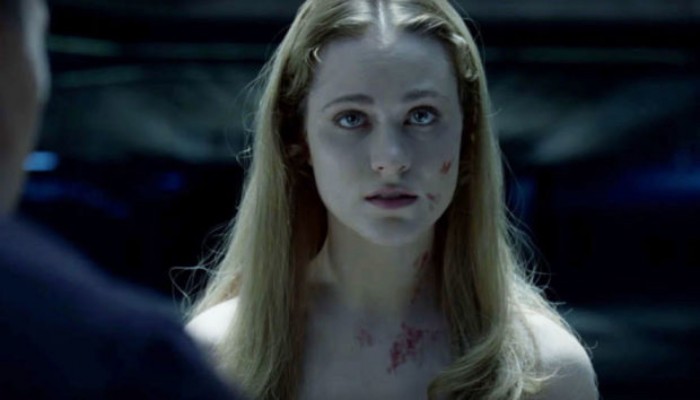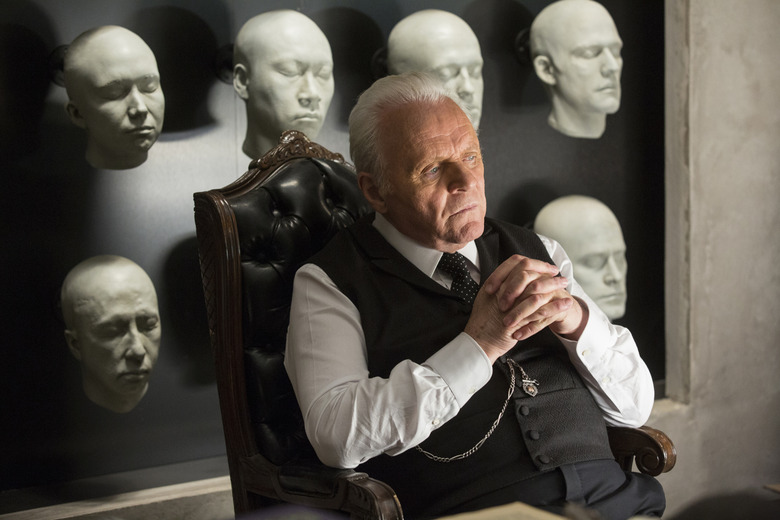'Westworld' Spoiler Review: 10 Questions From "The Stray"
Welcome back to our weekly deep dive into HBO's Westworld, where we ask 10 questions about the latest episode. Some questions are literal and others rhetorical. Some have answers and others do not. A few of them are just excuses to talk about an aspect of the show that demands our attention.
This week: "The Stray," an episode that shed light on Westworld's past while promising a dark future.
Can We Kick This One Off With a Quick Tangent About Paintball?
Many years ago, back before internet television recaps were a thing and Westworld was just a fairly solid science fiction movie felt like Michael Crichton's dry run for Jurassic Park, I joined a group of friends on a trip to a paintball course to celebrate a birthday. Even if you've never done the paintball thing yourself, you probably know the drill – everyone wears protective masks, arms themselves with guns (or "markers") loaded with small balls of paint, and march on to various courses and engage in simulated combat. Sometimes you have a specific goal, like capturing your opponent's flag. Other times, it was just a last team standing situation.
But here's the thing about paintball: it can be terrifying. Yeah, you know you can't die from a paintball hitting you, but that doesn't mean it doesn't hurt. A paintball, especially one shot from relative close range, often leaves a bruise. I quickly found myself dreading the game, hiding behind cover and listening to paint splatter all around me and genuinely, from the bottom of my very soul, dreading the thought of actually making a move. I was perfectly safe in the grand scheme of things, but that assurance was overwhelmed by my lizard brain processing the "threat" I was facing and making it all seem a little too real. A simulation of danger, where pain acted as a punishment, didn't transform me into a hero on this fictional battlefield – it transformed me into a coward. Over the course of the day, I quietly stopped joining each new session and gave my assortment of ammunition to my friends.
I thought about this day while watching "The Stray," which reveals that the strange bullets in Westworld's guns (which decimate a robot) leave only a bruise on the guests. I thought about this day when one guest, following Teddy Flood and the sheriff into the hill in pursuit of the vicious outlaw Wyatt, finds himself face-to-face with an enemy that cannot actually harm him and still demands to be taken out of the action. I thought about what we've seen park guests enjoy in other moments from the series so far. It's not that anyone is opposed to violence or gun battles, but they seem to enjoy them most when they're in utmost control. The uncertainty of this narrative, the details of which remain under lock and key deep within Robert Ford's head, goes directly against the instant wish fulfillment that the rest of Westworld tends to offer.
In paintball, your opponents are human and they want to win. In Westworld, the game is automatically rigged in your favor. So what happens when you stumble across a storyline where overwhelming terror and loss directly conflict with the easy satisfaction of so many other storylines? Is Dr. Ford's new storyline an attempt to tap into something more primal, to activate the corners of the brain that would come alive when faced with an opponent who can actually defeat you rather than a robot who lives and dies at your whim?
Maybe. All I know is that I couldn't help but relate to the guy who demanded to be taken back to town because the experience was too damn terrifying.
How Much Damage Has Bernard Done?
One thing is starting to become crystal clear: Bernard Lowe (Jeffrey Wright) is a troubled man and many of Westworld's current problems may very well begin with him. Although Dr. Ford's new code, the "reveries," seem to have activated something sinister within the hosts, the initial seed may have been inadvertently planted by Bernard.
Let's talk about what we know. We know that Bernard has been having secret, off-the-books meetings with Dolores (Evan Rachel Wood), where he engages her in conversation, probes her with questions that aren't part of any routine diagnostics, and offers her reading material. We see that his latest book assignment is Alice in Wonderland, a thematically appropriate (if a little on-the-nose) choice for a series about characters living in a reality that is beyond their control or full understanding. And perhaps most importantly, we now know more about Bernard's backstory: his young son has died, his wife is seemingly estranged, and he's almost certainly not coping with his grief particularly well.
To address the question proposed at the top of this section, it's not entirely clear how much damage Bernard has done to Westworld and the code that runs the thousands of hosts throughout the park. But that may not be the right question. The right question may be "What does Bernard hope to gain from pushing Dolores to act outside of her programming?" In Dolores, in the hosts, does he see the chance to nurture and educate the child that was taken from him? Have his instincts as a grieving father overwhelmed the cautious scientist?
If he is trying to be a father to Dolores, if he wants to be her guide on the path to being more human, we must dwell on the impossible and cruel requests he is making of her. With each passing day, Dolores becomes more self-aware, more in touch with the actual nature of her reality. But he asks her to stay in her loop, to continue engaging in her repetitive narrative, to not stray from the same doomed path that always sees her family dead and finds her assaulted in the barn. Bernard has given her a sliver of humanity, but he hasn't undone the shackles. Bernard has transformed a machine into a slave and if there's one thing history has taught us, slaves rightfully tend to revolt.
Are We Starting to Like More Characters Now?
One side effect of spending so much time with Jeffrey Wright this week and learning more about Bernard Lowe's backstory is that he has truly started to come into focus as a character. Wright puts up an ironclad exterior, but "The Stray" exposes the weaknesses in his armor. The tough-talking programmer, the scientist, is human enough and lonely enough to err. We're finally getting to know him.
"The Stray" also brought other members of the cast into focus. Jimmi Simpson's William continues to be the closest thing we have to a full audience avatar, the seemingly good guy who is as disgusted by the antics of many Westworld visitors as we are. He's especially appealing when he shares the screen with Ben Barnes' Logan, who feels like an amalgamation of every toxic trait you'd never want in a male friend or family member. The fact that William wants to wander into the woods and "white hat" his way through what Logan calls a "JVC" storyline speaks volumes about what kind of man he is. William visits a great city for the museums and Logan scours the local bars hoping to get laid.
Ashley Stubbs (Luke Hemsworth) and Elsie Hughes (Shannon Woodward) also stepped into the spotlight this week after two episodes of being go-to exposition spouters. While their storyline ultimately ends with some of the creepiest developments we've seen yet on this show, the road to those revelations allows us to actually get to know these people. The head of park security and the up-and-coming programmer make for an amusing odd couple, with his macho posturing bouncing off her withering sarcasm, and sending them on a mission where they are bound to bicker and clash goes a long way to letting us understand who these people are. She's curious and he's not. He's prepared for the worst and she's not. And most of all, they are going to need each other's expertise if they hope to survive whatever lies ahead.
What Really Became of Arnold?
There's a noteworthy hole in Robert Ford's story about his former partner, the mysterious Arnold. We know that he was there when Westworld was in its infancy and we know that he was quietly erased from the park's history by the suits and we know that he died. But as Anthony Hopkins regales us with tales of the park's early days, he doesn't explain the cause of death. He doesn't dwell on what actually went down with his partner-in-robotics. Although he does suggest that Arnold wouldn't have been on board with their work becoming the basis for a lurid theme park.
With that in mind, consider Ford's warnings to Bernard. It sounds like Arnold stopped viewing their creations as machines, artificial constructs built in labs and brought to simulated life with lines of code. He wanted to give their creations life, to offer them a thought process powered by a "God", a "bicameral mind" that would eventually transform into something resembling actual consciousness. We'll touch more on the bicameral mind in a bit, because the other big takeaway from this big conversation is that Bernard's secret meetings with Dolores appear to be doing exactly what Arnold wanted to do so many years ago. Bernard has unwittingly (or wittingly?) picked up Arnold's thread.
Of course, the fact that the details of Arnold's actual fate remain unrevealed is telling. Even if he's not around, his ghost (figuratively speaking) certainly is. He may very well be haunting the park, the ghost in the machine whose ill-fated work from decades ago has been re-activated by a grieving father. Remember how the pilot mentioned a park failure from thirty years earlier? Could this be the event that killed Arnold, that forced Ford and the others to lock down his work for good?
Are We Defined By Our "Backstory"?
Last week, I wondered if each episode of Westworld would feature James Marsden getting killed. "The Stray" did not disappoint on this front. Once again, Teddy Flood, the suave gunslinger with a dark and tortured past, found himself obliterated by forces beyond his control. He's Westworld's Kenny at this point.
But while Teddy Flood's continuing demises could be darkly funny, "The Stray" goes a long way to transforming him into a tragic figure on the level of poor Dolores. Marsden, the human equivalent of a Ken doll whose greatest onscreen trait is his ability to be completely earnest, is perfectly cast as a handsome blank slate western archetype who is oblivious to the tragedy that is his mere existence. Through Dolores, Westworld explores an artificial being slowing gaining self-awareness and harnessing her memories. Through Teddy, Westworld explores just how thoroughly doomed the hosts really are, how meticulously controlled their every action truly is. It's a special kind of nightmare: there is a God and he means only the worst for you.
The big moment for Teddy this week involved him finally getting a backstory after years of being motivated by a bunch of vague nothingness. The way Ford casually explains how they simply didn't bother to explain why this tortured gunslinger is so tortured in the first place is both chilling and hilarious – in the eyes of Westworld's God, they why of his suffering isn't as important as the mere fact that he's suffering. But now he has a backstory. He has a face for his pain. He has Wyatt, the psychotic former soldier turned outlaw. Ford has given Teddy a reason to exist.
And what a terrifying thought that is: the idea that existence is meaningless unless you have that One Moment, that defining day, that shapes who you are. Is Teddy Flood more tragic as the blank slate with a habit of running into bullets or the more complex guy whose every motivation can be traced back to his time spent battling a monster? Neither of those options feels fully human and they're a reminder that Westworld's hosts are approximations of people, not people. At least not yet. And if they do become people, if they become sentient, how will they react to knowing they are half-baked creations from a God who views them as playthings?
How Would You Spend Your Time at Westworld?
Here is my illness: when I watch Jurassic Park and the credits roll, I still feel like I would happily visit Jurassic Park if I was offered the chance. The same applies to Westworld. I would totally visit Westworld and I would probably make a number of bad decisions.
While Westworld continues to ask philosophical questions about the nature of the universe and present a growing number of intriguing mysteries about its world and characters, I continue to be won over by its depiction of a working science fiction theme park. I love how various members of the behind-the-scenes team can take elevators from an underground complex up into the park itself, recalling the tunnels that famously run under several Disney theme parks. I love how when a guest decides that he wants out of a storyline that is too intense for him, one host finds an in-character excuse to escort him back to town. It reminds me of my brief stint as an actor in a haunted house attraction, where we were trained to remain in character even when a guest demands to be shown to an emergency exit halfway through the experience.
And really, this section is just an excuse to talk about how well Westworld uses various guests to provide additional humor and insight in various scenes. While the hosts play out their programmed loops and act like they're in a fairly traditional western, the "normal" people who are accompanying them provide both gallows humor and insight. Having an eager female visitor accompany Teddy on his quest to kill Wyatt is the kind of inspired detail that makes this show such a genuine pleasure to watch. Teddy is in a western, she's in an interactive entertainment experience, and we're in a science fiction story. Having tourists on hand to deflate so many dramatic moments is inherently funny and odd and a reminder that we're never going to look as cool as a robot shaped James Marsden.
Having guests on hand also increases the horror of the show's more unsettling moments, like when a visitor accompanies the bandits to the Abernathy ranch and participates in the rape and massacre of the family. It's one thing for this horrifying and scripted event to exist, but it's another thing altogether for someone to willingly participate in the proceedings and from that side of the equation. In Westworld, evil isn't just something robots are programmed to do – it's a fun way to spend a vacation.
What's Up With Wyatt and His Followers?
We still don't know much about Robert Ford's new storyline, other than it finally gives Teddy Flood a backstory and that a mysterious black steeple in the middle of the desert will play a role. We're supposed to be in the dark, of course. Even the company doesn't know what Ford is working on, something that has left everyone at the park feeling a little on edge.
So let's talk about the aspect of the new storyline that we do know about: the character of Wyatt, the former soldier who went nuts, became a mass murderer, and now leads a team of fellow lunatics who wear the flesh and bones of their victims. And perhaps most importantly, these men don't seem to go down when Teddy or his guest companion unload their weapons on them. It's almost as if Ford has gone and created a supernatural villain, something truly evil.
But if we're going to start floating theories for the sake of floating theories...what if Wyatt's men aren't hosts at all? What if they won't go down because, for some reason, Ford's new storyline involves real people playing a role? It would explain why the bullets had no effect on them, but it's a theory that ultimately raises far more questions than answers.
Once Again: Where is Westworld?
In the past weeks, we've asked where Westworld could possibly be located. After all, it's in a massive landscape where every animal is an artificial creation except for the flies. It's apparently isolated enough that park employees need to live on site and have to rotate home every few months. Guests reach the park via an extremely fast train. And this week, we saw park employees communicating with loved ones via computer banks and it's implied that getting a signal from the park can be difficult.
This only adds fuel to the wild theories suggesting that the park is located on a terraformed Mars or even some kind of space station. After all, we know that the show takes place far enough into the future that most diseases have been cured (to say nothing of the theme park populated by lifelike robots you can screw and kill), so going full science fiction wouldn't be that much of a stretch. In any case, there has to be a reason why the show has obscured these details. By deliberately sidestepping an explanation, Westworld is inviting this kind of speculation and I'm starting to feel like the park's actual location is going to be a big surprise of some kind.
Why Did the Stray Wander Off?
In one of the creepiest moments in Westworld yet, Ashley and Elsie finally locate the "stray," the host who has wandered off course, and discover something truly horrible. The robot has fallen into a pit from which he cannot escape and the sight of this man, who looks so lifelike, clawing at the wall like a mindless machine is the stuff of nightmares. It's nothing new to Ashely and Elsie, though. She deactivates him, he ventures into the pit to remove the host's head for analysis. But when that saw is deep in its neck, the host somehow awakens, throws Ashely aside, climbs out of the pit and bashes his own head in with a boulder. Westworld has been an eerie show since frame one, but for a few minutes, it took the plunge straight into horror.
The story of this stray raises more questions than answers. Why did he abandon his group, leaving them alone to argue about who's going to chop wood because the only robot programmed to handle the axe has walked away from the storyline? Why was he carving the constellation of Orion into his woodwork? And most importantly, how was he able to overcome his programming and awaken? Is it the same hiccup that allowed Maeve to awaken mid-surgery last week?
I will wager a guess about why the stray chose to bash his own brains in. If the illness spreading amongst the hosts involves obtaining even a glint of self-awareness and knowing what they are and the exact nature of their world, it surely provides the proper motivation to take their own lives. To wake up and realize that you exist in a constant loop, that you've been murdered thousands of times, that you're currently having your head sawed off and you are somehow not dying...it's something unfathomably awful.
Future episodes will surely address the whys and the hows of what's going on with the stray and why Orion and so on and so forth, but right now, we're left with a scene of terror that challenges everything we know about how this park operates. Ashely and Elsie should be afraid. They should be very afraid.
Is Dolores Hearing the Voice of God?
Okay, let's talk about the bicameral mind for a moment.
This theory, coined by American psychologist Julian Jaynes and explained by Anthony Hopkins' Dr. Robert Ford, suggests that primitive human minds operated in a fashion far different from our own. While modern man hears his own thoughts and knows that is his singular mind churning and thinking and creating solutions, early man may have heard his own thoughts, assumed he was hearing the voice of a higher power, and acted according to those orders. Bicameralism suggests that we learned to think because we took orders from ourselves, thinking they were coming from an external source. Rather than a unified mind, we were literally of two minds – one that commands and one that obeys.
It's a fascinating (and controversial) concept and while the jury is out on whether or not the bicameral mind actually existed in our reality, it appears to be manifesting in Westworld. And we may know where we can point a finger. Ford's old partner, Arnold, suggested giving their creations bicameral minds that would, over time, develop into a full-blown consciousness. This plan was shot down and Arnold died and Westworld went on to run successfully for decades. But now, malfunctioning hosts are having one-sided conversations with "Arnold" as they systematically murder fellow hosts that have killed them in past storylines. And Dolores, who is remembering her past abuses at the hands of the Man in Black in the midst of her regular loop, who has been specifically programmed to be unable to use a weapon, hears a voice that allows her to overcome her programming and pull the trigger on her assailant.
It's not clear to whom that voice belongs. It could be Arnold, whose old ideas continue to haunt the park in mysterious and troubling ways. It could be Bernard, whose off-the-record meetings have ignited a spark in her growing consciousness. It could be something or someone else altogether, yet another mystery to toss on the pile. In any case, the takeaway here is that Arnold's ideas have officially been given a test run and they work. The portion of Dolores that is forced to forget, to follow a strict set of guidelines, can be overruled by another voice. For all intents and purposes, Dolores has discovered the voice of God.
Stray Observations

